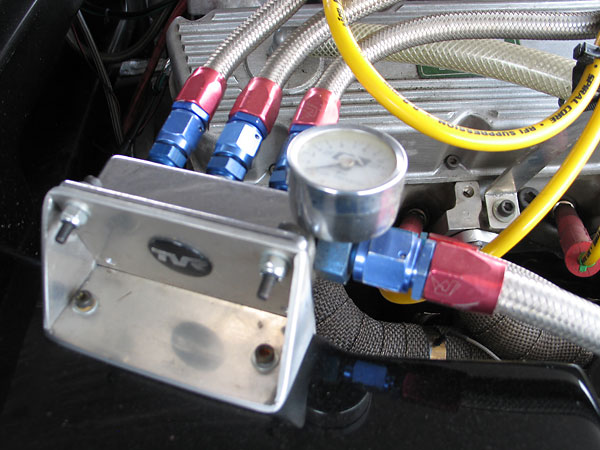Hi Everyone,
The PO of my 67 coupe installed an electric fuel pump near the tank, and it is working just fine. The other day I had the left rear tire off for a reason unrelated to fuel, and I started looking at the hose that ties the steel line coming from the front of the car to the steel line going into the engine compartment. I began to think about what would happen if that hose started leaking. Since the car has an electric fuel pump, the pressurized gas would leak out and drop awfully close to the exhaust. If the leak was big enough to stall the engine and if the car had a pressure switch (it doesn't, only an inertia switch), then the pump would stop after the carbs emptied and presumably the fire would be short-lived. If the leak were small, I imagine that the engine would keep running and there might be a somewhat longer lasting but less intense fire.
It seems to me that ideally, the pressurized line from the pump would be steel all the way to the carbs. The suction line could contain hose since a leak would cause loss of prime to the pump. Since you have to have a flexible joint where the gas line reaches the engine compartment, the only way I can think of to have an all-steel pressure line would be either to have a stock mechanical fuel pump or an electric fuel pump mounted in the engine compartment.
So, am I just being paranoid? If not, has anyone with an electric fuel pump mounted near the tank tried to make the flexible joint at the engine compartment more robust? I've given some thought to fittings like this with stainless braided fuel hoses: http://www.jegs.com/i/Earl%26%23039%3Bs ... 0/10002/-1.
Thanks.
John
Potential for Pressurized Fuel Lines to Leak
Potential for Pressurized Fuel Lines to Leak
67 Coupe 110/4 spd
-
Jerry Whitt
- Posts: 887
- Joined: Thu Sep 26, 2013 2:42 pm
Re: Potential for Pressurized Fuel Lines to Leak
The fuel pump puts out about 3-4 pounds of pressure. The hose could leak, but with routine maintenance, the hose would be replaced as it gets older, any way.
Seems like you are looking for something to worry about.
Seems like you are looking for something to worry about.
Jerry Whitt
ASE CERTIFIED MASTER TECHNICIAN
Retired
Hemet, Callifornia
65 Monza, purchased new
65 Corsa convertible
ASE CERTIFIED MASTER TECHNICIAN
Retired
Hemet, Callifornia
65 Monza, purchased new
65 Corsa convertible
- bbodie52
- Corvair of the Month

- Posts: 12141
- Joined: Mon Aug 06, 2012 12:33 pm
- Location: Lake Chatuge Hayesville, NC
- Contact:
Re: Potential for Pressurized Fuel Lines to Leak

Mr. Gasket mechanical fuel pressure gauge (0-15psi), mounted to the Mr. Gasket triple outlet fuel block
Another approach would be to run a rigid line through the firewall directly to a fuel block mounted on the firewall, similar to the fuel block shown above. AN fittings and flexible braided fuel line could be used to connect from the fuel block to the carburetors, and if desired a mechanical fuel pressure gauge could also be mounted on the fuel block to allow you to monitor fuel pressure output from the electric fuel pump.
I have never seen a problem with continuing with the original mechanical fuel pump configuration. They have generally proven to be reliable when tested in millions of Corvairs over fifty years of trials. There apparently were a batch of after-market replacements that were substandard with inaccurate pressure springs and weak diaphragms that invaded the replacement market for a while, but efforts by Clark's Corvair Parts and other reputable suppliers have apparently weeded these faulty units out of the replacement inventory.
The mechanical pumps are easy to replace — even in a roadside repair — and they are relatively inexpensive when compared to an electric pump, mounting hardware and fittings, and safety interlock switches to cut power to the pump when the engine stops. The mechanical pump is cheap enough in comparison to an electric pump configuration to permit two pumps to be purchased — one as a spare to keep in the trunk — in the event of a primary pump failure.
So if you are concerned about the hazards of pressurizing the fuel line from the fuel tank, either of the above approaches could ease your concern. Mounting the electric pump in the engine compartment is usually not recommended, as electric pump designs are usually intended to push the fuel, and not to draw it for long distances, such as would be encountered with an engine compartment install.
Here are a few examples of using a fuel block arrangement and/or AN fittings and braided fuel lines...
Brad Bodie
Lake Chatuge, North Carolina
 1966 Corvair Corsa Convertible
1966 Corvair Corsa Convertible
Lake Chatuge, North Carolina
 1966 Corvair Corsa Convertible
1966 Corvair Corsa Convertible